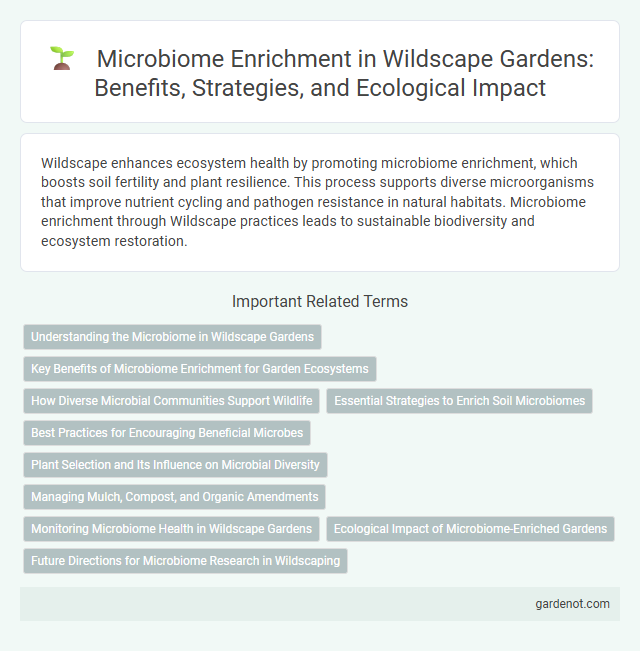Wildscape enhances ecosystem health by promoting microbiome enrichment, which boosts soil fertility and plant resilience. This process supports diverse microorganisms that improve nutrient cycling and pathogen resistance in natural habitats. Microbiome enrichment through Wildscape practices leads to sustainable biodiversity and ecosystem restoration.
Understanding the Microbiome in Wildscape Gardens
Microbiome enrichment in Wildscape gardens enhances soil health by promoting diverse microbial communities crucial for nutrient cycling and plant resilience. Understanding the microbiome involves analyzing bacteria, fungi, and other microorganisms that interact symbiotically with native plants to improve ecosystem stability. This approach supports biodiversity, fosters plant growth, and contributes to sustainable garden management.
Key Benefits of Microbiome Enrichment for Garden Ecosystems
Microbiome enrichment enhances soil health by increasing microbial diversity, which improves nutrient cycling and plant resilience against diseases. This process supports robust root development and boosts plant growth, leading to a more vibrant and sustainable garden ecosystem. Enriched microbiomes also promote natural pest control, reducing the need for chemical interventions and fostering ecological balance.
How Diverse Microbial Communities Support Wildlife
Wildscape environments with diverse microbial communities enhance wildlife health by promoting nutrient cycling and boosting immune resilience. Rich microbiomes support digestion, disease resistance, and ecological balance critical to species survival. These microbial interactions create a stable habitat, fostering biodiversity and ecosystem sustainability.
Essential Strategies to Enrich Soil Microbiomes
Essential strategies to enrich soil microbiomes include incorporating organic matter such as compost and biochar, which provide nutrients and improve soil structure. Implementing crop rotation and cover cropping enhances microbial diversity by fostering varied root exudates and reducing soil-borne diseases. Minimizing chemical inputs and practicing no-till agriculture preserve native microbial communities essential for nutrient cycling and plant health.
Best Practices for Encouraging Beneficial Microbes
Encouraging beneficial microbes in Wildscape environments relies on maintaining diverse native plant species that provide organic matter and root exudates to support microbial populations. Avoiding chemical pesticides and fertilizers preserves soil microbial balance, promoting natural nutrient cycling essential for ecosystem health. Incorporating compost and mulch enhances soil structure and moisture retention, creating optimal conditions for microbiome enrichment and resilience.
Plant Selection and Its Influence on Microbial Diversity
Selecting diverse native plant species in wildscape design significantly enhances microbiome enrichment by promoting a broad spectrum of microbial communities in the soil. Specific plants, such as legumes and certain grasses, release root exudates that attract beneficial bacteria and fungi, increasing microbial diversity and ecosystem resilience. Optimizing plant variety based on native soil conditions directly influences nutrient cycling and supports a balanced microbiome crucial for sustainable wildscape health.
Managing Mulch, Compost, and Organic Amendments
Microbiome enrichment in Wildscape ecosystems thrives through effective management of mulch, compost, and organic amendments that boost soil health and biodiversity. Applying high-quality, nutrient-rich compost enhances microbial activity, promoting nutrient cycling and plant growth while suppressing pathogens. Consistent layering of organic mulch improves moisture retention and habitat for beneficial microbes, establishing a balanced and resilient microbiome essential for sustainable landscape restoration.
Monitoring Microbiome Health in Wildscape Gardens
Monitoring microbiome health in Wildscape gardens involves analyzing soil and plant root microbial communities to ensure balanced biodiversity and ecosystem functionality. Utilizing DNA sequencing and bioinformatics tools allows for the detection of beneficial microorganisms essential for nutrient cycling and disease suppression. Regular assessments guide targeted interventions that promote microbiome enrichment, enhancing plant resilience and overall garden sustainability.
Ecological Impact of Microbiome-Enriched Gardens
Microbiome-enriched gardens significantly enhance soil health by promoting diverse microbial communities that improve nutrient cycling and plant resilience. Increased microbial diversity supports beneficial symbiotic relationships, reducing the need for synthetic fertilizers and pesticides, thereby lowering environmental pollutants. These ecological benefits foster biodiversity, strengthen ecosystem stability, and contribute to carbon sequestration in Wildscape habitats.
Future Directions for Microbiome Research in Wildscaping
Future directions for microbiome research in wildscaping emphasize the integration of microbial community data with plant and soil health metrics to enhance ecosystem resilience. Advanced metagenomic and metabolomic techniques are being developed to characterize functional microbial traits that promote nutrient cycling and stress tolerance in native plant species. Harnessing these microbial interactions offers promising strategies to optimize biodiversity and sustainability in wildscape habitats.
Microbiome enrichment Infographic

 gardenot.com
gardenot.com